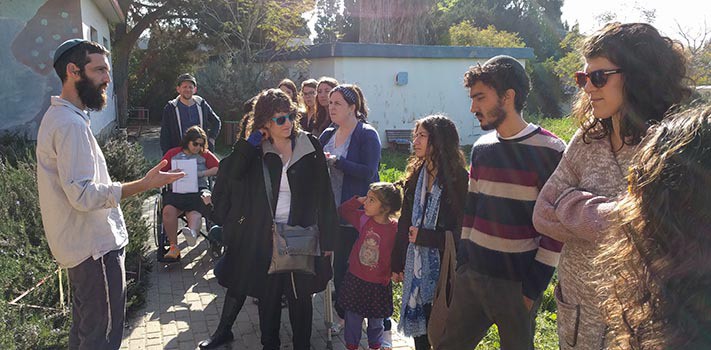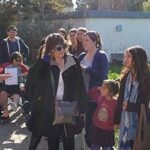by Morriah Kaplan
Member of GariNYC: Brooklyn, NY

We started off the day early at the Waldorf-Hassidic school that the community ‘garin’ within Moshav Shuva built. Their pedagogy is inspired by teachings of the ancient commentator Rabbi Chiya, who insisted on teaching the Torah to his students in an experiential way. We spoke with the kindergarten teacher, who described how they teach the students to appreciate and honor individual differences, to have patience that success won’t come in a single day, and to connect with their world – including their religion – in an emotional and experiential way, rather thing simply using their intellect. Building this school was a huge accomplishment of the Shuva community, and it’s brought more young families to the area, particularly those who wish to teach their children Hassidic values along with a solid secular education.
We then traveled to Be’er Sheva to enjoy a delicious breakfast and conversation at Café Ringelblum, a coffee shop run by a community called Kehillat Kama which emerged a decade ago to revitalize the Daled neighborhood of Be’er Sheva. The café employs youth-at-risk, and has graduated over 60 youth with a high success rate of employment retention, educational attainment, army enlistment and re-engagement with their families. Kehillat Kama also runs a number of other projects in the neighborhood, with the goal of engaging youth and supporting other marginalized and under-served groups, through an NGO called ‘Tor Hamidbar’. We spoke with Bella, the CEO of Tor Hamidbar, and I was impressed by the way she spoke about decision-making within the community. She emphasized the importance of bringing big decisions back to the community, and getting the staff of the NGO and community members to engage with each other in making these decisions. Bella promotes these conversations even if she already has an answer she thinks is right, because of her commitment to getting buy-in from the entire Kama community.
We continued on to Beerot, a community of American Olim in the Negev who formed to create social action projects in the vicinity of Be’er Sheva. In particular, they recently initiated a new project to give people on short-term Israel trips, such as Birthright, a more meaningful way to interact and engage with Israeli society. This project, titled P’nima, is hoping to bring young people to come into contact with intentional communities like the ones we’ve been visiting, in order to understand the social needs in Israel and the great work that’s being done to address it. They’re also working with Kehillat Kama to incubate new intentional communities as well as social enterprises, and we discussed mechanisms of funding in these social action projects and in our own projects.
After meeting with Beerot, we learned about M’Dor L’Dor, a community of Jews that came to Israel from the Caucasus mountains area of the former Soviet Union. Young Jews from the community – which identify themselves as “Mountain Jews” – formed a ‘garin’ to address the needs of their wider community, particularly the harsh negative stereotypes that exist about their community and the ways in which these negative stereotypes have led to deep disempowerment. We spoke to them about the work that their ‘garin’ is doing through their NGO to help their community integrate into wider Israeli society while also maintaining their traditional culture and values.
We then came back to Shuva to prepare for Shabbat. We attended a Kabbalat Shabbat at the new home of one of the members of the Shuva garin, and then had a delicious meal prepared by another member of the garin, Galia. There were 28 of us total – including 6 kids under the age of 5! Though space was somewhat tight, we ate and sang together, before being joined by Itai, another member of the Shuva garin, who led us in a discussion of the parsha Zachor, which we’re instructed to read the week before Purim.
In Zachor, we’re instructed to “remember Amalek,” who attacked the weakest members of the Israelite community from the back of the procession as the Jews traveled through the desert. We talked about what this means, and were informed by the writings of the Reb. Nachman, who wrote that we need to remember “olam ha’bah,” or the world to come, so that we always remember what we’re working towards, the world we’re striving to create.
Remembering Amalek could therefore be taken as a directive to remember the oppression we experienced in the past so as not to let this same oppression befall us or other peoples, and to remember to never act out this oppression on another people by our own hands. In a way, remembering oppression and those who suffer is a way to help us remember what we’re working towards, a harsh reminder of the suffering in the world which compels us to continue our fight against injustice. It also helps us remember the importance of creating communities where people can be seen and held, and where their divine spark can be recognized and nurtured.
